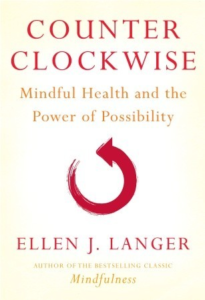Once in awhile, I discover a book I want everyone I care about to read. Counterclockwise: Mindful Health and the Power of Possibility by Ellen J. Langer not only changed my ideas about health and aging, but inspired me to broader applications in the areas of influence and communication. It leaves no doubt that the mind and body are not separate entities. Rather, they interact in ways we might not yet understand, but can still turn to our advantage.
Dr. Langer’s work on aging began in 1970 when she found that nursing home residents who were allowed to make more of their own decisions, such as where to receive visitors, choices of house plants for their rooms, whether and when to watch movies, were happier and healthier than other residents.
In 1979, Langer and her students took some residents on a retreat. For one group, they recreated the world of 1959, playing the oldies, showing only progr

counterclockwise & influence
ams from the 50’s on TV, having the subjects discuss events of those times as if they were current events. The other group talked about the 50’s, but did not live a 50’s life. While almost all enjoyed health improvements, the group that lived as if it were 1959 improved notably better than the control group.
More recently, two groups of hotel housekeeping staff members, or “room attendants,” received instruction about the health benefits of physical exercise. The experimental group was also told that the CDC classifies their ordinary daily work, cleaning hotel rooms, as exercise. The control group didn’t hear that their work counted as exercise.
Without making any changes in their kind and amount of physical activity, that is, continuing their usual work without adding any other exercise, the experimental group’s impression of how much exercise they got increased. Plus, they experienced the benefits—weight loss, improved muscle mass, lower blood pressure, etc., even though their physical activity didn’t change. Only two things changed—1. their knowledge that they were, in fact, getting exercise and 2. their improved health.
In contrast, the control group actually gained weight, lost muscle mass, etc. (Fortunately, after the study ended, they were told that their work counted as exercise so that they, too, could enjoy the same benefits as the experimental group.)
With my focus on communication, I was most interested in Langer’s work on how words affect people. In one study, subjects were asked to solve anagrams. For the experimental group, the anagram solutions were words often associated with aging, such as “forgetfulness.” The control group had words with no such connotation. After completing the task, persons from the experimental group walked from the test room to the elevator more slowly than those from the control group.
And words affect not only lay people, but also health care professionals. A video of a man being interviewed was shown to Freudian therapists. When the man was described as a “job applicant,” to one group of therapists, they saw him as well adjusted. But when another group heard him called a “patient,” they saw him as poorly adjusted and in need of therapy. (Behavioral, as opposed to Freudian, therapists saw the man as well adjusted, whether labeled as a job applicant or a patient.) As my brother likes to say, “To a man with a hammer, everything looks like a nail.”
In “Politics and The Law of Attraction, Part II,” I posited that there is science behind the Law of Attraction, though there is still much to learn. The Law of Attraction is the concept that we attract what we focus on and give our energy to.
Counterintuitive adds even more scientific support to this notion. If merely working anagrams with solutions like “forgetfulness” can cause people to walk more slowly, just think what we do to ourselves when we continue to read about every new foible or outrage committed by a politico we already know we will vote against in the next election. Then, we talk about it, over and over. We post or respond to posts on social media with zinger after zinger, each making the same basic point with a different tweak of sarcasm.
As I wrote last time, we don’t change anyone’s mind this way. We only drive those who disagree further away. Meanwhile, we saturate ourselves and those around us with negative energy. In view of the information in Counterintuitive, I believe we also negatively affect our health.
Counterintuitive has inspired me to double up on my efforts to practice the Law of Attraction. One way you can put more focus on the positive is to read Counterintuitive. Your blood pressure will thank you.

